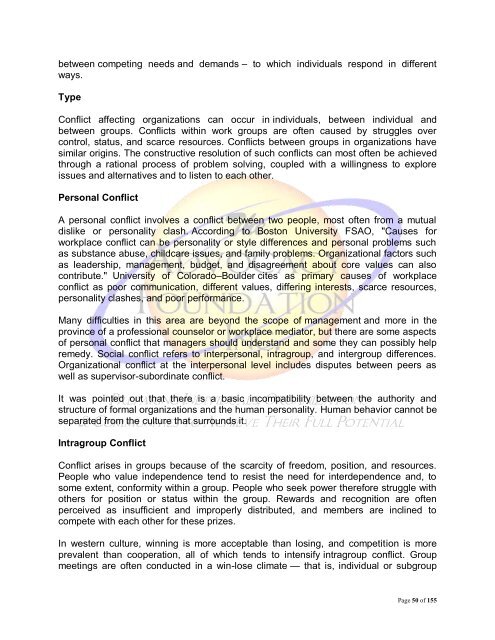Organizational Dysfunction
Organizational Dysfunction
Organizational Dysfunction
Create successful ePaper yourself
Turn your PDF publications into a flip-book with our unique Google optimized e-Paper software.
etween competing needs and demands – to which individuals respond in different<br />
ways.<br />
Type<br />
Conflict affecting organizations can occur in individuals, between individual and<br />
between groups. Conflicts within work groups are often caused by struggles over<br />
control, status, and scarce resources. Conflicts between groups in organizations have<br />
similar origins. The constructive resolution of such conflicts can most often be achieved<br />
through a rational process of problem solving, coupled with a willingness to explore<br />
issues and alternatives and to listen to each other.<br />
Personal Conflict<br />
A personal conflict involves a conflict between two people, most often from a mutual<br />
dislike or personality clash. According to Boston University FSAO, "Causes for<br />
workplace conflict can be personality or style differences and personal problems such<br />
as substance abuse, childcare issues, and family problems. <strong>Organizational</strong> factors such<br />
as leadership, management, budget, and disagreement about core values can also<br />
contribute." University of Colorado–Boulder cites as primary causes of workplace<br />
conflict as poor communication, different values, differing interests, scarce resources,<br />
personality clashes, and poor performance.<br />
Many difficulties in this area are beyond the scope of management and more in the<br />
province of a professional counselor or workplace mediator, but there are some aspects<br />
of personal conflict that managers should understand and some they can possibly help<br />
remedy. Social conflict refers to interpersonal, intragroup, and intergroup differences.<br />
<strong>Organizational</strong> conflict at the interpersonal level includes disputes between peers as<br />
well as supervisor-subordinate conflict.<br />
It was pointed out that there is a basic incompatibility between the authority and<br />
structure of formal organizations and the human personality. Human behavior cannot be<br />
separated from the culture that surrounds it.<br />
Intragroup Conflict<br />
Conflict arises in groups because of the scarcity of freedom, position, and resources.<br />
People who value independence tend to resist the need for interdependence and, to<br />
some extent, conformity within a group. People who seek power therefore struggle with<br />
others for position or status within the group. Rewards and recognition are often<br />
perceived as insufficient and improperly distributed, and members are inclined to<br />
compete with each other for these prizes.<br />
In western culture, winning is more acceptable than losing, and competition is more<br />
prevalent than cooperation, all of which tends to intensify intragroup conflict. Group<br />
meetings are often conducted in a win-lose climate — that is, individual or subgroup<br />
Page 50 of 155

















